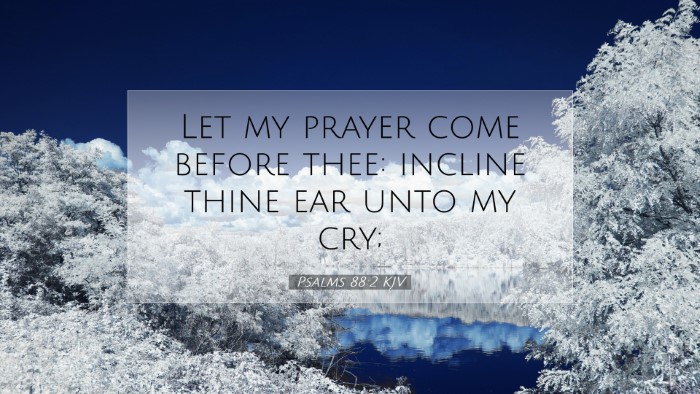Psalms 88:2 Commentary
Bible Verse: "Let my prayer come before thee: incline thine ear unto my cry;"
Introduction
Psalm 88 is often regarded as one of the darkest among the Psalms, a raw expression of despair and anguish. This commentary will discuss the themes, insights, and implications found in Psalm 88:2 by drawing from various public domain commentaries including those by Matthew Henry, Albert Barnes, and Adam Clarke.
Verse Analysis
Psalm 88:2 emphasizes two key actions: the act of prayer and the plea for divine attention. This verse encapsulates the essence of a distressing supplication from the psalmist.
1. The Nature of Prayer
“Let my prayer come before thee”
- Matthew Henry describes prayer as the soul's communication with God, emphasizing its necessity in times of trouble. The psalmist's request for his prayer to be acknowledged reflects a deep longing for God's presence.
- Albert Barnes highlights that the appeal for his prayer to come before God signifies the urgency and earnestness of the psalmist's plea. He interprets this as a longing for an audience with the Almighty, indicating both desperation and hope.
- Adam Clarke notes that when the believer prays, they do so with the expectation that God hears. The phrasing suggests a plea that transcends mere recitation of words; it denotes heartfelt communication longing for divine response.
2. The Plea for Divine Attention
“Incline thine ear unto my cry”
- Matthew Henry further explains that the metaphor of God inclining His ear suggests a God who is willing to listen and respond. It serves as a reminder to the believer that God’s attention is always within reach, even in deep distress.
- Albert Barnes discusses the importance of this phrase, interpreting it as a call for God's attention and compassion. The psalmist presents his cry as one that requires not just hearing but also empathetic understanding from God.
- Adam Clarke interprets the word "cry" as a profound expression of need, suggesting an emotional or physical crisis. Clarke emphasizes the intensity of the psalmist's need for God's immediate response to his circumstances.
The Context of Despair
Psalm 88 is unique in its absence of the typical structure found in many psalms that ultimately lead to praise and deliverance. Instead, it lingers in darkness, aligning with the themes of affliction present in the liturgy of lamentation.
1. Historical Context
- Matthew Henry suggests that the psalmist could be experiencing personal suffering or perhaps facing persecution, pointing to the historical plight of the Israelites. This context elevates the prayer's urgency, reflecting communal anguish in addition to individual despair.
- Albert Barnes draws attention to the possibility that this psalm could have been composed during the time of exile, a period filled with hopelessness among God's people. This enhances the significance of the plea for divine intervention amidst overwhelming circumstances.
2. Spiritual Significance
The psalmist’s cry represents an acknowledgment of human vulnerability and the necessity of divine assistance. In the face of suffering, the believer's resort to prayer is timely and vital.
- Matthew Henry emphasizes the inseparable link between despair and the pursuit of God—highlighting that in the depths of sorrow, God offers a refuge.
- Adam Clarke reminds readers of the importance of recognition of one's need for God, which is itself a form of worship, placing faith in God's ability to provide comfort and support.
Theological Implications
This verse and the broader context of Psalm 88 raises profound theological themes about suffering, divine silence, and the nature of prayer.
1. The Problem of Pain
Psalm 88 challenges simplistic views of faith where prayer always leads to immediate relief. It recognizes the reality of prolonged suffering.
- Albert Barnes articulates that genuine faith often exists in tumult, and the human experience of pain can coexist with a relationship with God, where He is still honored in lament.
- Matthew Henry incorporated this understanding into pastoral care, encouraging the church to address the realities of suffering instead of glossing over them with pious platitudes.
2. Assurance of Divine Attention
Despite the dire circumstances illustrated in the psalm, the act of prayer itself reaffirms that one remains in communion with God. Prayer serves as the anchor during turbulent times.
- Adam Clarke emphasizes that through prayer, even the most desperate believer can experience God's presence, suggesting that although God may seem silent, He is always aware and listening.
- Matthew Henry concludes that prayer not only calls upon God’s listening ear but simultaneously nourishes the soul, fostering hope even when circumstances are bleak.
Conclusion
Psalms 88:2 offers a poignant reminder of the rawness of human emotion in prayer. It serves as an essential text for understanding the complexities of lament in both personal and communal contexts. For pastors, students, theologians, and scholars, this verse offers fertile ground for exploring themes of suffering, divine attentiveness, and the nature of authentic prayer. The combined insights of Matthew Henry, Albert Barnes, and Adam Clarke paint a picture of a God who faithfully hears the cries of His people, even amid the shadows of despair.


